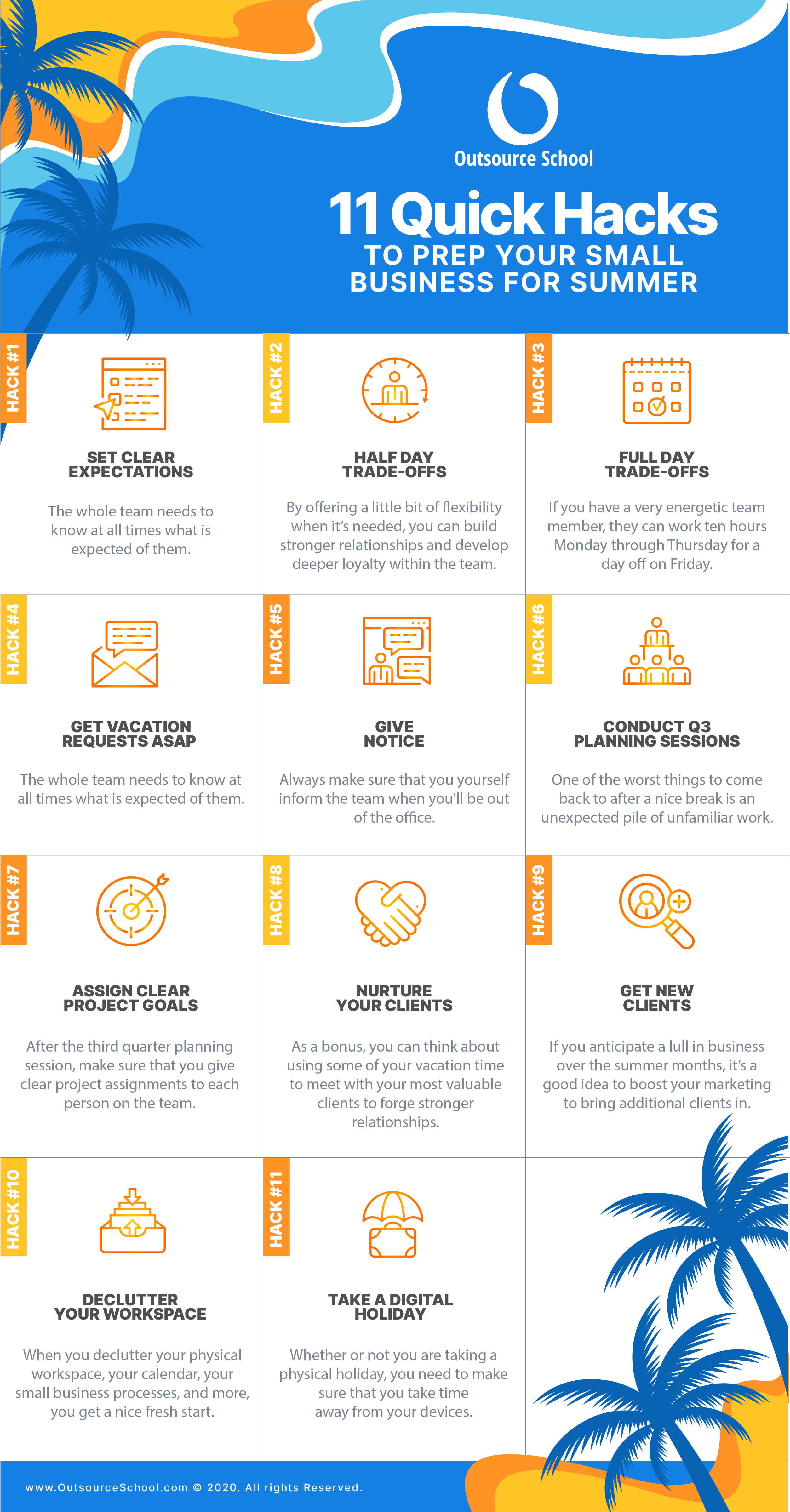Small business summer breaks are never simple. As a business owner, getting ready for summer means worrying about the business the whole time you prepare to take that much-needed rest time. It’s not ideal.
You may want to take more time off from work to relax and spend time with family. Your team may want to do the same. There may be Fridays when people want to leave early to go outside or go on a weekend trip.
How do you make sure that your small business summer doesn’t turn into an unproductive period for your business?
The key is preparation. The more preparation you focus on upfront, the better your small business summer will be. Below are some tips you can use to stay on track and not lose focus.

(1) Set Clear Expectations
The whole team needs to know at all times what is expected of them. This flow is easier to maintain when everyone keeps regular working times and days. With summer breaks coming into play, you’ll need to do a review of those expectations.
A week before anyone takes a break, hold a meeting for everyone concerned. Make sure that they know what period of time that person will be off work. They also need to know who to go to as an alternative for whatever they might need while that person is away. If it’s a leadership position, it is vital that team members have someone else who they can turn to if they have any questions about work or need a decision made on a task. Not having an alternate in place will lead to delayed deadlines. With potentially several people aiming to take time off during your small business summer, this can add up to a lot of production issues.
(2) Half Day Trade-Offs
Some people might want to have an extra half-day off when they are planning a weekend trip. You can offer half days on Friday or Monday to give them valuable travel time. Just make it clear that you need them to work extra hours to make up for that half-day. The best way to do this is to require that the time be made up in advance. Suggest working an extra hour each day for four days before they are scheduled to be on leave. It’s not a lot to put in one more hour a day. So, it won’t be likely to affect their productivity, and they will be psyched as they work towards their free half day.
This doesn’t only apply to the small business summer period. You can offer the same to anyone who needs some time to take care of errands or other responsibilities throughout the year. By offering a little bit of flexibility when it’s needed, you can build stronger relationships and develop deeper loyalty within the team.
(3) Full Day Trade-Offs

Similar to the half days above, you can offer the whole of a Friday or a Monday off, or even two or more days. It just depends on how much notice you get and how much time there is to do the make-up hours. If you have a very energetic team member, they can work ten hours Monday through Thursday for a day off on Friday. This can also work over a two-week period for two days off. If they give four weeks’ notice, the time can be made up one hour each day, and so on.
For multiple days off, you can consider putting the person on longer days for a longer period of time. If that won’t work, you can talk with other members of the team and see who would like to cover those extra hours. As long as they can do the work at the same high level, there won’t be any disadvantages for your business. You will only reap the benefits of being understanding and flexible with the team.
(4) Get Vacation Requests ASAP
You should always require team members to give you advance notice of their vacation plans. This makes sense in light of the above and also because it gives you more time to plan.
For a half or a full day, you should be informed at least one week ahead of the scheduled time off. For two days, you should have two weeks’ notice. For longer leaves of absence, have the team inform you at least four weeks ahead of time.
You always have options available to allow your people to take much-needed breaks during the small business summer period. Even in the rare event that you face multiple requests for longer-term breaks, not enough time or capability to make up hours, and not enough resources to cover the time, you can take on temporary relief help. The beauty of running a remote team of freelancers is that there is always someone out there who will be open to taking on short-term work. Most A-level freelancers even have networks that you can tap into for awesome referrals. You can offer this option to team members who are willing to find and train their temporary replacements and guarantee that the work gets done at the same high level as if they were doing it themselves.
(5) Give Notice
Always make sure that you yourself inform the team when you’ll be out of the office. Let them know at least two weeks ahead of time when you plan to take a break from work. They all need this time to prepare for when you’ll be away.
Make sure that you have a meeting with at least the team leaders to go over any additional responsibilities you want them to handle. You won’t be there to give approval on tasks or answer their questions. These will fall on the team leaders.
The team members also need to know how things will flow without you, and who they need to approach in your place. If you’re not meeting with the entire team, at least endorse the team leaders, explaining that they will be in charge in your absence. They need this vote of confidence from you so that the team will give them the same level of respect that they give you. Then the team leaders can meet with the team members to explain how things will go. Remind the team leaders that they need to make sure everyone knows what needs to be done while you’re gone. They need to review important deadlines, for example, and make sure that everyone has access to all the resources that they need to meet those deadlines and deliver at a high level.
You won’t necessarily be passing off all your tasks to the team leaders. Still, just doing a review of the various responsibilities that each person has will put them at ease. It will also give you a chance to show that you have confidence in them. This will give them the motivation they need to make sure that work flows smoothly while you’re away. In fact, just telling them that you are depending on them will help them bring their A-game every day.
(6) Conduct Q3 Planning Sessions

Before the small business summer fever hits, you need to meet with the team for third-quarter planning. Everyone needs to know what’s in store for the coming months. The details of the projects that they will be expected to work on can greatly influence their vacation plans. This is not only in terms of scheduling but also the actual time and focus that they need to complete the third quarter goals that you will set.
A good quarterly plan will have timelines set for major goals. Depending on this timeline, some team members may change their plans. They need to know the goals so that they can be responsible team members and fit their breaks in where they won’t cause disruptions in the flow of work. This makes operations easier for you, too, as you manage a team that may be short-staffed on some days.
Do not allow any team member to go on vacation without a clear expectation of what they will be diving into when they get back. One of the worst things to come back to after a nice break is an unexpected pile of unfamiliar work. They will quickly come down from their vacation high, leaving them feeling discouraged and unmotivated. Furthermore, it often leaves a person regretting their time off, which compounds into frustration and can lead to a big drop in productivity. Always make sure that everyone knows what they will find when they get back to work.
(7) Assign Clear Project Goals
After the third quarter planning session, make sure that you give clear project assignments to each person on the team. Everyone needs to know which goals they are part of. They also need to know which tasks under those goals they are responsible for completing.
This is especially true when you have specialized tasks that need to be completed by specific people. It’s not easy, for example, to reassign infographic design or blog post writing to another team member since the needed skills may not be common within the team. When you give clear assignments, you are helping each team member to properly manage their time — including vacation time — so that they can complete goals and take those much-needed breaks, too. Without these specifics, one will invariably be sacrificed in favor of the other, which is really bad for overall productivity.
(8) Nurture Your Clients
If you think that operations might slow down for a bit despite all your preparations, you need to let your clients know. Make sure that you post a vacation schedule or send a newsletter out that informs them of reduced hours or availability. As a bonus, you can think about using some of your vacation time to meet with your most valuable clients to forge stronger relationships.
(9) Get New Clients

Most people think about going on vacation during the summer months. This includes your clients. If you anticipate a lull in business over the summer months, it’s a good idea to boost your marketing to bring additional clients in. This will help to cover the slow period so your numbers don’t suffer.
(10) Declutter
Spring is the traditional clean-up time, but it doesn’t work out for all businesses. Summer is a great alternative time to get things organized. When you declutter your physical workspace, your calendar, your small business processes, and more, you get a nice fresh start. This will help you focus more on what’s important, like growth and profitability, and help you to have a more relaxing break. The same concept applies as the year comes to a close. If you can do this quarterly, all the better.
Take time to clean up messes, discard files you don’t need, do maintenance on your computer, and the like. If you’re working on marketing, it’s also a good time to look over your social media presence and brand messaging.
(11) Take a Digital Holiday
Whether or not you are taking a physical holiday, you need to make sure that you take time away from your devices. Most business owners are so used to being busy that it actually becomes difficult not to work. If you want to get that rest that you need so much, you need to avoid the dangers of answering emails, tweeting, and checking in on the team during your holiday. Otherwise, you’ll come back to work exhausted instead of re-energized.
Set aside a specific time each day during your break to check in on work. Let the team know what time they can contact you, and make sure they know to do so only in case of emergencies where they really need you specifically. Then you can relax and enjoy a well-deserved break and return to work ready to conquer.
Final Thoughts
Your small business summer doesn’t have to be a time that you dread. You can crush it while taking actual time off work if you prepare in advance using these eleven quick hacks that we’ve outlined for you.
Would you like to know how to be certain who your next hire should be? Or maybe you are having a hard time deciding what parts of your business can be outsourced with virtual assistants, right now. We can help you answer these questions, and help you to discover what new systems you should add to scale your business faster. Set up a free hiring consultation with us at Outsource School today – simply book here!


